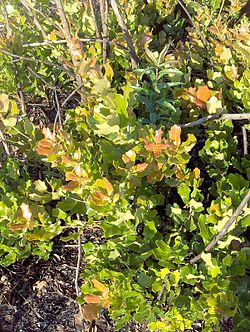- Quercus chapmanii
-
Chapman Oak 
Scientific classification Kingdom: Plantae (unranked): Angiosperms (unranked): Eudicots (unranked): Rosids Order: Fagales Family: Fagaceae Genus: Quercus Species: Q. chapmanii Binomial name Quercus chapmanii
Sarg.Quercus chapmanii, commonly referred to as the Chapman Oak, is a species of oak tree that grows in the Southeastern United States.[1]
Contents
Taxonomy
Synonyms include Quercus minima forma pygmaea, Quercus minima forma reasoneri, Quercus minima var. pygmaea, Quercus obtusiloba var. parvifolia, and Quercus pygmaea.[2]
Description
Chapman Oaks are perennial dicots.[3] They grow into shrubs or small trees up to 45 ft (13.7 m) in height.[4]
Distribution
Q. chapmanii is found in the states of Alabama, Florida, Georgia, and South Carolina. [3]
References
- ^ Duncan, Wilbur H.; Marion B. Duncan (1988). Trees of the Southeastern United States. Athens, Georgia: The University of Georgia Press. pp. 229. ISBN 0-8203-1469-2.
- ^ "Quercus chapmanii - Species Page". Atlas of Florida Vascular Plants. Institute for Systematic Botany, University of South Florida. http://florida.plantatlas.usf.edu/Plant.aspx?id=644. Retrieved 2 January 2010.
- ^ a b "PLANTS Profile for Quercus chapmanii (Chapman oak)". USDA PLANTS database. United States Department of Agriculture Natural Resources Conservation Service. http://plants.usda.gov/java/profile?symbol=QUCH. Retrieved 2 January 2010.
- ^ "NPIN: Quercus chapmanii (Chapman oak)". Native Plant Database. University of Texas at Austin. http://www.wildflower.org/plants/result.php?id_plant=QUCH. Retrieved 2 January 2010.
External links/potential refs
- http://www.efloras.org/florataxon.aspx?flora_id=1&taxon_id=233501016
- Map showing distribution in Florida (with parts of Alabama and Georgia)
- http://www.pollenlibrary.com/botany_researchers_maps.php?view=species.php&species=Quercus+chapmanii&common=Chapman's+Oak

This Fagales article is a stub. You can help Wikipedia by expanding it.
